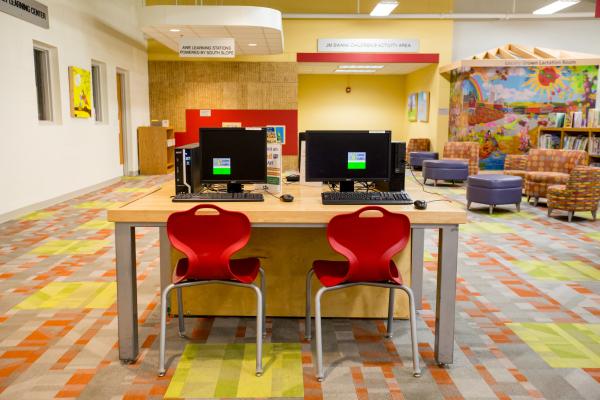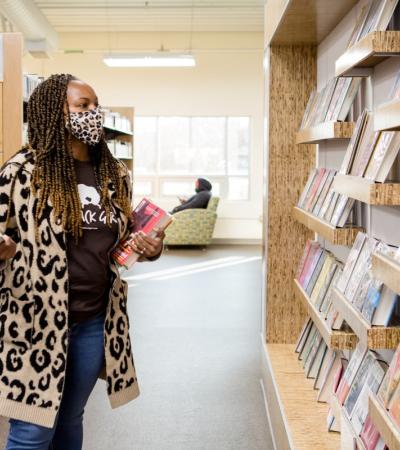Libraries provide educational programming, a welcoming space, and access to computers and internet connection. This last point has become increasingly important during the pandemic, especially for libraries serving rural areas. In order to safely continue serving their communities, they have faced both the obstacles of switching to virtual programming and ensuring people can access it, on what is often a tiny budget.

ALA’s Libraries Transforming Communities: Focus on Small and Rural Libraries initiative provided small and rural libraries across the country with funding to do community engagement. The first cohort of 200 libraries took place from January through July 2021. Analyzing the final reports grantees submitted, it is apparent that spending on technology, particularly computers/tablets, internet hotspots, and Zoom licenses, was essential for many libraries to connect with their communities. These investments will contribute to long-term capacity for these libraries to hold additional programming throughout the pandemic and to improve the community’s access to technology.
Making pandemic programming possible
Out of the 171 libraries who shared data with us, 75 had hosted their event in a virtual or hybrid format, and over half of these did not have videoconferencing software prior to the grant. For many organizations, moving events online was an immediate response to the pandemic – but for a significant portion of grantee libraries, the software license required money that was not available.
Some libraries also lacked the camera and/or microphone needed to host a video call (and one library did not have a computer at all). Once the initial costs of this equipment and software are covered, grantees became able to adjust program formats in response to ever-changing pandemic conditions for the remainder of the year. The experience library staff gained in learning to use Zoom or similar software is also valuable, as they will be better able to support patrons who struggle with this now-essential technology.
Some library representatives were concerned that less tech-savvy community members or those without reliable internet would be left out of online events, but did not have space to safely host a gathering in the library building. One solution several came up with was hosting events outdoors, which had its own audio/video requirements, such as obtaining a speaker system or projector. Similarly to investing in software, this has made it much easier for libraries to hold ongoing COVID-safe events.
Bridging the digital divide
Spending money on technology upgrades not only enables community conversations from a technical standpoint, but it also gave libraries a way to respond to community needs. Four libraries chose to hold discussions around digital inequity, and all four decided to use the majority of grant funds to make high-speed internet more accessible, primarily through loanable wireless hotspots. One library had planned to purchase hotspots but managed to obtain them through a different funding source, and after discussion with community members chose to put the grant funds towards providing Wi-Fi in a local park that is open at all hours.
Many more libraries hosted open-ended discussions around community needs and the role the library could play in addressing them. As Cindy Jewett, the Director of New Hampshire’s James A. Tuttle Library explained, “Everything changed and we wanted to adapt and thrive after the pandemic, but we needed input from the community.” Jewett was aware of some community needs even before holding a discussion: “We fully opened up on October 2020 with restrictions and we found that our community desperately needed laptops to access Zoom calls, job interviews, telehealth, and court appearances. Our library did not even have a computer with a camera, so we were at a huge disadvantage.” They immediately purchased a laptop for patrons to use in the library, and after discussion with residents, they reached a decision to purchase an additional two laptops and two Wi-Fi hotspots for lending.
The community continues to make regular use of these resources, and Jewett describes the chance to invest in technology as “catapult[ing] our library into the 21st century.” This type of investment was quite common in the cohort: in total, 33 libraries reported that grant money had enabled them to address internet connectivity needs through hotspots or access points, while 29 invested in additional computers or tablets for patrons to use.
Expanding effects
In a few cases, libraries’ actions had repercussions not only in the community they serve, but in neighboring areas as well. One branch manager serving a community with internet access issues reported that “we expected patrons to be happy with [the hotspots and Chromebooks we purchased]; however, we were not expecting such a positive response to garner our entire library system to extend it to other branches.” The library system will be supporting an additional 14 branches across 3 counties to provide internet and computer access – “the tools [patrons] need in order to succeed in today’s digital world.” A librarian in a different area reports that they were able to share their experience starting a hotspot check-out service with public libraries across their state, and hopes it will provide a blueprint for other library systems to start a similar service.
Knology is a nonprofit research organization that produces practical social science for a better world. The organization pursues this goal to help professionals in a variety of sectors build inclusive, informed, and cooperative societies that can thrive together with the natural systems on which we all depend. As a transdisciplinary collective of over 30 social scientists, writers, and educators, the organization's work process is built on equity, transparency, and deliberation.



